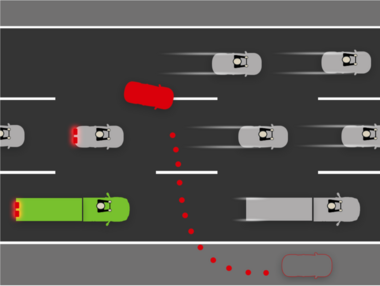The Car that Cares
Contact
Project Lead
Prof. Dr. Susanne Boll-Westermann
susanne.boll(at)offis.de
The Car that Cares
Socio-technical Automotive Systems – The Car that Cares
The socio-technical relationship in a future caring car is characterized by the relationship between an individual driver with the car’s technical system and the entire surrounding traffic and roadside infrastructure. The scenarios of relevance for this project are complex driving situations where several drivers, cars and smart infrastructure cooperatively plan and execute driving maneuvers. The vision for a future socio-technical car system–a car that cares–goes far beyond: cars will be equipped with sophisticated cooperative assistance systems that allow the individual traffic participants to solve specific driving maneuvers cooperatively and negotiate the course of action as part of the socio-technical system of the driver, the car and the surrounding traffic participants.

The overall objective of The Car that Cares (CtC) is to develop processes, techniques and software tools to enable the development of socio-technical car systems that continuously adapt to their internal context (e.g., health state of the driver, current tasks) and external context (e.g. weather, traffic) context and offer situation-aware cooperative interaction with the driver of the car. These processes, techniques and tools will be integrated in the Reference Technology Platform and a methodology that keeps human factors and functional design in balance during all phases of system design, implementation and evaluation. The AIM living lab will be used as target platform to finally demonstrate the use of the new technologies developed in this project. In the context of the Living Lab AIM we will also develop a model-based approach to integrate different building blocks (in-vehicle as well as infrastructure) of advanced assistance and automation systems. The principal investigators in the project are from related research areas of cognitive psychology, human modeling, ambient assisted living, multimodal user interfaces, and critical systems engineering. In different work packages their work will focus on the following tasks: The development of a model the cooperation of many drivers and many systems involving innovative forms of driver assistance system interaction. Multisensory observation of the driver within the social-technical system will drive the assessment of the drivers cognitive, emotional and health state. Based on the situation in the socio-technical, cognitive, emotional and health state of the driver, the car that cares offers assistance and recommendations to the driver to increase safety, comfort and health through adaptive multimodal user interfaces involving different senses. The methods, techniques and tools developed will be integrated in a design methodology that keeps human factors and functional design in balance during the phases of system design, implementation and evaluation.


